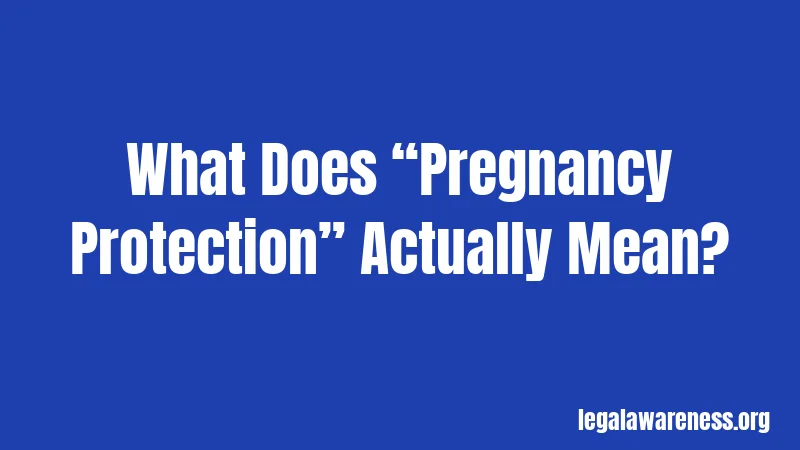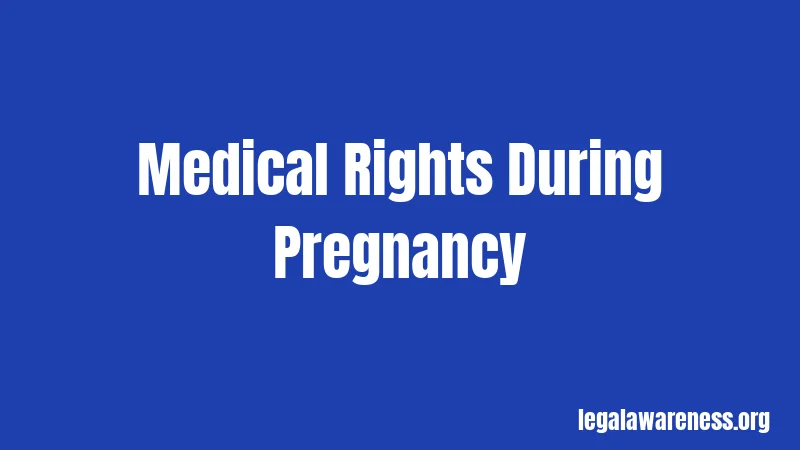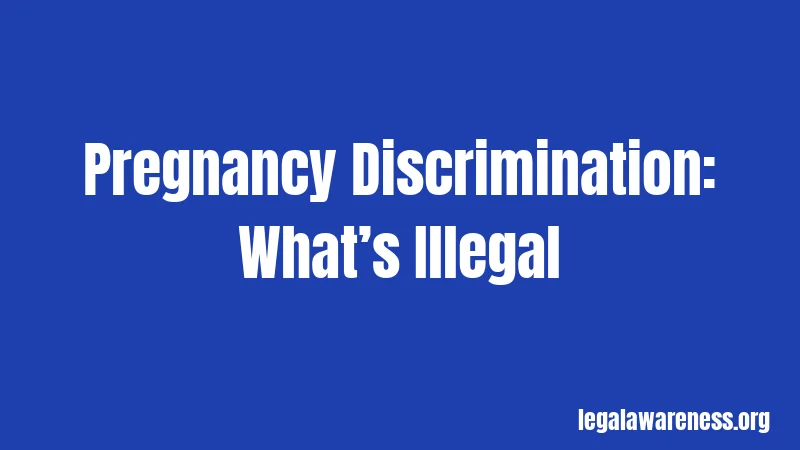New York Pregnancy Laws in 2026: Your Complete Rights Guide
Most people don’t realize how many legal protections come with pregnancy. New York actually has some of the strongest pregnancy laws in the country. That’s great news for you. Let’s break down exactly what protections exist and what you need to know.
If you’re pregnant, planning to get pregnant, or just curious about the rules, this guide covers everything. We’ll talk about workplace rights, medical protections, and what happens if someone violates your rights. Stay with me here.
What Does “Pregnancy Protection” Actually Mean?

Think of it like a legal shield. When you’re pregnant, the law recognizes you need special considerations. You can’t be fired for being pregnant. Your employer has to let you take medical appointments. These aren’t just suggestions—they’re legally enforceable rights.
New York takes this seriously. The state has multiple laws protecting pregnant people. Some are state laws. Others come from federal law that applies everywhere. Together, they create a pretty comprehensive safety net. Pretty straightforward, right?
Your Workplace Rights While Pregnant
Protection From Discrimination
Here’s the big one: your employer cannot discriminate against you because of pregnancy. New York law is crystal clear on this. You’re protected from hiring discrimination, firing, promotions, pay, and job assignments.
Not sure what counts as discrimination? Here’s an example. If your boss says you’re “not dedicated enough” because you’re pregnant, that’s illegal. If you get passed over for a promotion solely because you’re having a baby, that’s illegal too. Same applies if someone reduces your hours or cuts your pay.
The protection covers everything related to your pregnancy, childbirth, or related medical conditions. This includes morning sickness, bed rest, and recovery from delivery. You’re also protected if you’re trying to get pregnant or dealing with infertility.
Reasonable Accommodations
Your employer must provide reasonable accommodations for pregnancy-related needs. This is important. You can request changes to your work schedule, breaks for medical appointments, or modifications to your job duties.
What counts as reasonable? That’s the legal question, honestly. Generally, it means your employer can’t make accommodations that would cause them undue hardship. But they have to try. If you need to sit down more, they should allow it. If you need extra bathroom breaks, that’s reasonable. If you need a stool or a modified desk, that’s usually reasonable too.
You need to ask for accommodations in writing when possible. Tell your employer specifically what you need. Don’t assume they’ll automatically know. Most people get this part wrong, so document everything.
Time Off for Medical Appointments
You have the right to take reasonable paid or unpaid time off for medical appointments related to pregnancy. This includes doctor visits, ultrasounds, and prenatal testing. Your employer can’t penalize you for going to these appointments.
Wondering if you need permission? You should inform your employer, but they can’t deny the request if it’s reasonable. Try to schedule appointments outside work hours when possible, but if you can’t, that’s okay. The law protects you.
Paid Family Leave
New York has a paid family leave program. This is separate from other protections and it’s genuinely powerful. You can take up to twelve weeks of partially paid leave after your baby is born. You can also take leave before birth if you’re medically unable to work.
The benefit replaces about 67% of your weekly wages (up to a maximum amount). The program applies to employers with more than one employee. You pay into this through payroll deductions, so it’s technically insurance you’ve already purchased. Make sense, right?
You need to apply for this benefit. It doesn’t happen automatically. Contact your employer’s HR department or the New York Department of Financial Services to apply. File at least thirty days before you need the leave, if possible.
Medical Rights During Pregnancy

Access to Prenatal and Maternal Care
You have the right to appropriate prenatal care. Your health insurance must cover preventive prenatal care without cost sharing. That means no copays for covered services. This includes regular checkups, ultrasounds, and screening tests.
Insurance companies can’t impose restrictions that make prenatal care harder to access. They can’t require you to see only certain doctors if it limits your options. They can’t deny coverage for medically necessary services. That’s the law.
If your insurance denies coverage for something your doctor says you need, you can appeal. New York requires insurers to have a fair appeals process. You have the right to see the reasons in writing.
Right to Informed Consent
Your doctors must explain your medical options in language you understand. Before any procedure or treatment, you get information about risks, benefits, and alternatives. You can ask questions. You can take time to decide.
Nobody can force medical treatment on you without your consent. This applies to labor and delivery too. If your doctor wants to induce labor, do a cesarean section, or use pain medication, they have to discuss it with you first. You have the right to refuse treatment (though your doctor can explain the risks).
This seems basic, but honestly, it’s the part many people miss. You’re in control of your medical decisions. Doctors advise, but you decide.
Privacy and Confidentiality
Your pregnancy information is private. Your medical records can’t be shared without your permission. Your employer shouldn’t know your medical details unless you tell them. Even your family’s knowing about a pregnancy is your choice.
This protection extends to workplace records too. If you request accommodations, your employer only needs to know what accommodations you need, not the details of your condition. Hold on, this part is important. Don’t give your boss more medical information than necessary.
Maternity and Parental Leave Laws
Job Protection During Leave
When you take family leave, your job is protected. This is crucial. Your employer can’t fire you or demote you for taking leave. When you return, you go back to the same position or an equivalent one with similar pay and benefits.
This applies to pregnancy leave, bonding leave, and family care leave. Your benefits continue during leave (some benefits, not all). Your seniority accrues while you’re gone. When you come back, you’re treated like you never left.
There are limited exceptions. If the company is closing or laying people off regardless of your leave, that’s different. If there’s a legitimate business reason unrelated to your leave, that might apply. But these exceptions are rare and narrowly defined.
Notice Requirements
You need to give your employer notice about your leave when possible. Thirty days is the standard timeframe. If you have a medical emergency or unexpected early delivery, obviously thirty days isn’t possible. Your employer can’t penalize you.
Provide notice in writing. Include when you plan to take leave and how long you expect to be gone. If dates change, update your employer. Yep, that’s all you need to do.
Coverage During Your Absence
Your employer must maintain your health insurance while you’re on leave. You keep paying your employee portion (if there is one), but coverage continues. When you return, everything resumes as if you never left. No gap in coverage, no loss of benefits.
This matters hugely. It means you and your baby stay covered during and after leave. No stress about losing insurance right when you need it most.
Pregnancy Discrimination: What’s Illegal

Let me be direct: discrimination based on pregnancy is illegal. Full stop. This applies whether you’re currently pregnant, recently pregnant, or planning pregnancy.
Your employer can’t refuse to hire you because you’re pregnant. They can’t fire you. They can’t reduce your pay or benefits. They can’t deny promotions or training opportunities. They can’t assign you “light duty” without asking if you want it. They can’t single you out for performance management.
Sound complicated? It’s actually not. The basic rule: treat pregnant employees like any other employee with temporary limitations or medical needs. If you’d give a non-pregnant employee with a broken leg accommodations, pregnant employees get the same consideration.
What if someone makes a comment like “Oh, you’re going to be a distracted parent” or “Pregnant women can’t handle this job”? That’s illegal discrimination. Comments about your gender combined with pregnancy status? Also illegal. Even if they say it’s just joking, it’s still discrimination.
You can file a complaint if this happens. Talk to HR first, usually. If they don’t help, you can file with the New York Division of Human Rights or the EEOC. We’ll cover that below.
Special Protections: Lactation Rights
New York law protects your right to breastfeed and pump at work. Your employer must provide reasonable break time for nursing or pumping. This includes when you return from maternity leave.
Your employer must provide a private space for pumping. It can’t be a bathroom. It should be a dedicated room or private area. If providing a space creates undue hardship, there are limited exceptions, but that’s rare.
The space needs a chair, table, and electrical outlet (if you’re using an electric pump). This isn’t optional. Your employer has to set it up.
You don’t need permission every time you want to pump. Break time is protected. It should be paid time if you’re on-site. If you have a flexible schedule, you can use your lunch break or unpaid break time too.
Pregnancy Complications and Medical Leave
Conditions Covered by Leave Laws
If you experience pregnancy complications like gestational diabetes, preeclampsia, or hyperemesis gravidarum, you may qualify for additional protections. These conditions can require time off or modified duties.
You have the right to medical leave if your doctor says you’re medically unable to work. This can be paid family leave, short-term disability, or other company benefits. Your employer can’t force you to work if you’re medically at risk.
Documentation matters here. Get a letter from your healthcare provider stating your limitations. Provide it to your employer and your insurance company. This protects you if questions arise later.
Okay, pause. Read this carefully. Different conditions qualify for different protections. Some require HR notification. Others don’t. Check with your specific employer about their policies. Most companies have specific procedures for this.
Workers’ Compensation and Pregnancy
Generally, pregnancy isn’t considered a work-related injury, so standard workers’ comp doesn’t apply. However, if you’re injured while pregnant, you’re still covered for the injury itself.
If you work in a hazardous environment and your pregnancy is affected, that’s different. If exposure to chemicals, radiation, or extreme physical demands harms your pregnancy, you might have workers’ comp or other claims. Talk to a lawyer about this.
Most people don’t deal with this issue. But if you’re in construction, manufacturing, healthcare, or similar fields, it’s worth knowing.
What Happens if Your Rights Are Violated
Filing a Complaint
If your employer discriminates against you, denies accommodations, or violates your pregnancy rights, you can file a complaint. New York has multiple agencies that handle this.
The New York Division of Human Rights investigates pregnancy discrimination. You can file within one year of the violation. The process is free. You need to describe what happened, when it happened, and who was involved. Be specific and include dates.
You can also file with the federal EEOC (Equal Employment Opportunity Commission) within 180 days of the violation. You actually don’t need to choose between state and federal. You can file with both.
Confused about the difference? Let me break it down. The state agency is usually faster. The federal agency sometimes has more resources. Both are legitimate. Many people file with both to cover all bases.
Your Legal Remedies
If someone violated your rights, you might get compensation. This could include back pay, front pay, benefits restoration, damages for emotional distress, and in some cases, punitive damages.
You might also get attorney’s fees and costs covered if you win. This means you don’t have to pay a lawyer out of pocket. That makes it easier to pursue justice.
Your employer can’t retaliate against you for filing a complaint. If they fire you or punish you after you complain, that’s illegal retaliation. You’d have additional claims for that.
Special Situations and Exceptions
Miscarriage and Pregnancy Loss
If you experience a miscarriage, stillbirth, or other pregnancy loss, you still have legal protections. You’re not suddenly unprotected. Your employer still can’t discriminate against you.
You might qualify for leave to grieve and recover physically. You can use personal leave, vacation time, or unpaid leave. Some employers offer bereavement leave. Check your handbook.
If your pregnancy loss requires hospitalization or medical treatment, that’s covered like any other medical condition. Your health insurance applies. You’re protected from discrimination.
Many people don’t realize this. If you experienced loss, know that the law still protects you.
Working While Pregnant in Hazardous Conditions
If your job involves exposure to dangerous substances, extreme heat, heavy lifting, or other hazards, you might need modified duties. You have the right to request accommodations.
This isn’t just physical jobs either. Healthcare workers exposed to infectious diseases, or people handling chemicals, all have protection. The law recognizes that some work environments pose risks to pregnancy.
Your employer must assess the hazard and provide accommodations if medically necessary. This might mean temporary job reassignment or modified duties. You keep your pay and benefits during the modification.
Same-Sex Couples and Surrogacy
New York pregnancy protections apply regardless of how the pregnancy occurred. If you’re carrying a child (biologically or through surrogacy), you have the same rights.
Same-sex couples, unmarried couples, and surrogates all have protection. The law doesn’t care about marital status or sexual orientation. Pregnancy is pregnancy.
Both intended parents can take family leave. You both get job protection. This is one area where New York’s law is genuinely progressive.
Frequently Asked Questions
Can my employer force me to take maternity leave? No. You can work as long as you’re medically able. Your employer can’t make you leave. But if your doctor says you can’t work, that’s different. Then you’d go on medical leave.
What if my employer doesn’t have an HR department? You still have rights. The law applies to all employers with four or more employees. For very small employers, some rules are slightly different. Contact the New York Department of Labor if you’re unsure.
Does paid family leave apply if I’m self-employed? Generally no, but self-employed people can voluntarily participate in the paid family leave program. You’d pay the full premium yourself. Check with the New York Department of Financial Services.
Can I be fired for being pregnant? No. Federal law (Title VII) and New York law both protect you. If you’re fired and you’re pregnant, that’s presumed to be discrimination unless your employer has clear documentation of another reason.
What about health insurance coverage before I qualify for my company’s benefits? New York requires insurance companies to cover pregnancy-related care. If you’re on your spouse’s plan, you’re covered. If you buy individual insurance, pregnancy is covered. There are no waiting periods for pregnancy.
Can my employer dock my pay for prenatal appointments? No. Time off for medical appointments is protected. You shouldn’t lose pay for reasonable appointment requests. If your employer does this, that’s a violation.
Final Thoughts
You have serious legal protections when you’re pregnant in New York. These laws exist because the state recognizes that pregnancy is a significant life event requiring special consideration. That’s powerful.
Know your rights. Communicate with your employer. Keep documentation of requests, appointments, and conversations. If something feels wrong, it probably is. You have remedies available.
And here’s the thing: these laws exist because people fought for them. Use them. Protect yourself. If you face discrimination or violations, you have options. Don’t suffer in silence.
For specific legal advice about your situation, talk to an employment lawyer. Many offer free consultations. Get professional guidance tailored to your circumstances.
Now you know the basics. Stay informed, stay protected, and congratulations if you’re expecting.
References
New York State Division of Human Rights: Pregnancy Discrimination https://dhr.ny.gov/
New York Department of Labor: Paid Family Leave https://www.ny.gov/sites/default/files/atoms/files/paidfamilyleave_ov.pdf
U.S. Equal Employment Opportunity Commission: Pregnancy Discrimination https://www.eeoc.gov/discrimination-type/pregnancy-discrimination
New York Department of Financial Services: Paid Family Leave Program https://www.dfs.ny.gov/consumers/life-insurance/paid-family-leave
New York State Labor Law Article 9: Discrimination Protections https://www.labor.ny.gov/
American Civil Liberties Union: Pregnancy and Workplace Rights https://www.aclu.org/
National Council of Jewish Women: Pregnancy Discrimination in the Workplace https://www.ncjw.org/
Centers for Disease Control: Pregnancy and Prenatal Care https://www.cdc.gov/pregnancy/
Equal Employment Opportunity Commission: Filing a Charge https://www.eeoc.gov/employees/filing-charge
